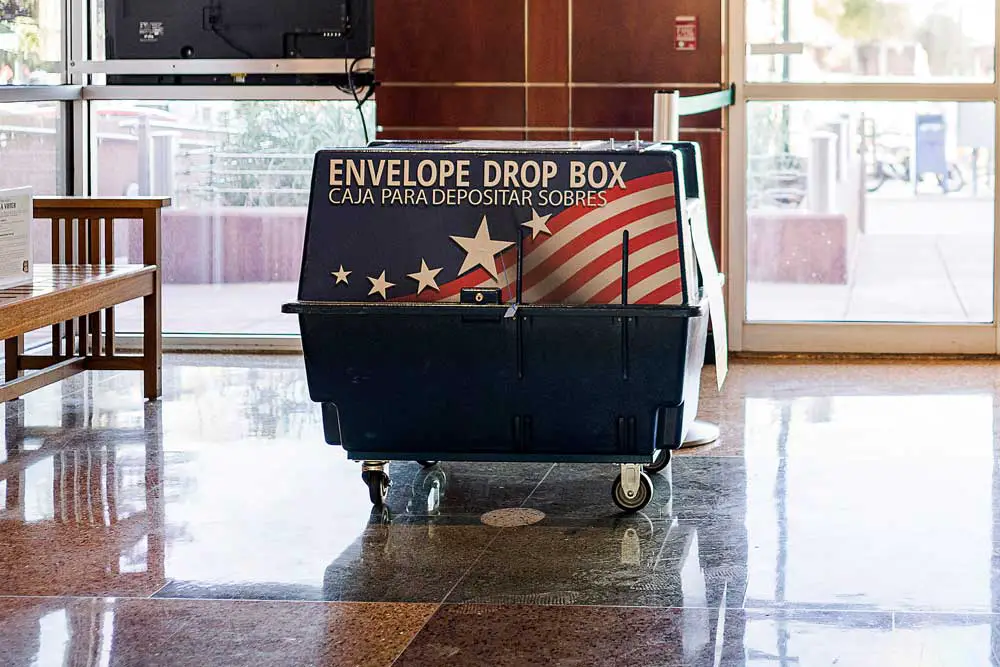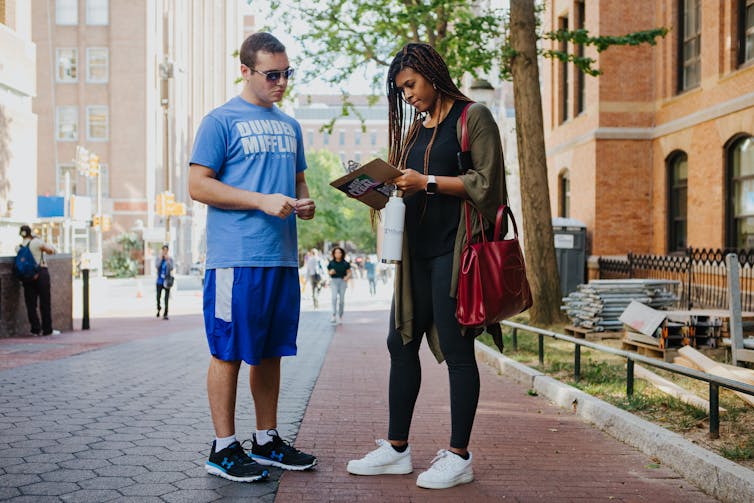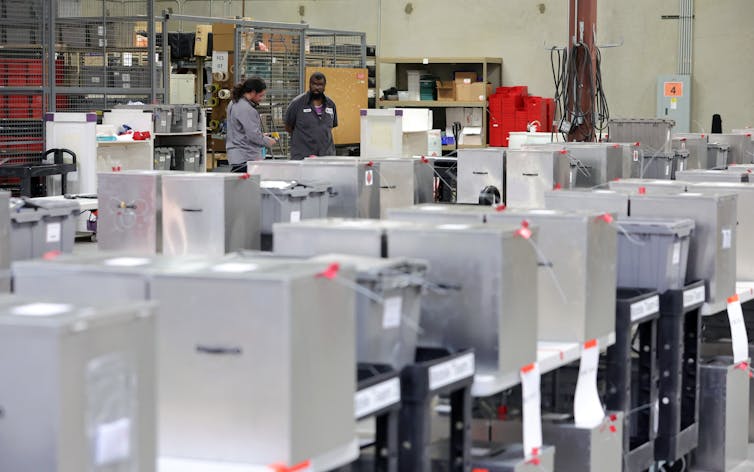
By Miriam Seifter and Adam Sopko
The run-up to Election Day is often a contentious time.
In recent years, it has also become a litigious time – parties increasingly turn to courts to resolve disputes about the rules for voting.
This year, our research shows a significant uptick of those lawsuits occurring in the state court system and challenging every step of the election process — from whether candidates or ballot initiatives qualify to appear on the ballot, to what address information must be completed in order to accept mailed ballots. It also extends to specific procedures for county clerks or poll watchers as voting occurs.
This surge in state litigation yields a mixed picture. As scholars of state courts and constitutions, we have studied the crucial role of state courts in safeguarding elections and democracy.
State courts have made important rulings – for example, protecting voting and rejecting extreme partisan gerrymandering – rooted in state constitutions’ distinctive democracy provisions.
But the current volume of state election litigation also has the potential to derail the safeguards that state courts can provide. When every aspect of an election becomes a lawsuit, negative effects may follow – including destabilizing elections, overwhelming already strained courts and imposing significant costs on states.
The numbers
In 2020, election litigation reached a new record high, with hundreds of lawsuits filed around the presidential election.
But experts like law professor Rick Hasen observed that it was too soon to know if the 2020 spike in lawsuits was a trend or an aberration. One potential explanation was that the pandemic and former President Donald Trump’s polarizing candidacy fueled the 2020 spike and that lawsuits would decrease in future years.
Two years later, a different picture is emerging.
The total volume of preelection litigation has dropped somewhat – a smaller drop than one might expect in a nonpandemic, nonpresidential election. Litigation in federal court has dropped precipitously, falling to less than half of its 2020 presence, our research shows.
But in state courts, rather than decreasing, preelection lawsuits have increased. Some of the rise is due to expected conflict surrounding the post-2020 redistricting process. Of greatest interest, we see a continuation or increase in conflict over “electoral mechanics” – lawsuits challenging the who, what, where and how of voting, even when there is no novel virus throwing an unforeseen wrench in those mechanics.
We emphasize that these numbers are provisional as of mid-October, and they are only estimates – and likely undercounts. State courts are notoriously difficult to research; there is no central clearinghouse of state lawsuits or decisions. Our tallies are based on searches in the legal database LexisNexis. Our full methodology and tallies are posted on our website.
State courts and their role in democracy
Rising interest in state courts does have potential upsides. State courts serve as a crucial line of defense for free and fair elections.
As one of us has explained elsewhere in work with legal scholar Jessica Bulman-Pozen, all 50 state constitutions include explicit pro-democracy provisions – a “democracy principle,” as a shorthand – including many clauses with no express federal counterpart.
Those resources make state courts more promising venues for protecting democracy than the U.S. Supreme Court has been of late. The court’s recent decisions have limited the avenues for protecting democracy, including by refusing to hear partisan gerrymandering claims and by limiting the reach of the Voting Rights Act, which prohibits racial discrimination in voting.
In contrast, recent state court decisions across the country have applied the democracy principle.
For example, state courts have upheld laws permitting voting by mail, imposed new remedies against extreme partisan gerrymandering and preserved the people’s ability to amend their state constitution.

Michelle Gustafson for The Washington Post via Getty Images
A closer look at this year’s cases – so far
Yet these significant pro-democracy decisions are only part of the bigger litigation picture, the most salient feature of which is its sheer volume.
The largest number of lawsuits involve whether a candidate can properly appear on the ballot. Such “ballot access” lawsuits are long-standing and typically involve candidates sparring over whether they or an opponent have satisfied requirements for petition signatures, residency or other paperwork requirements.
The next-largest categories, and we think the most concerning, encompass election administration and absentee voting – often challenging mechanical, even picayune matters.
In Wisconsin and Pennsylvania, for example, multiple suits contest whether mailed ballots can be counted if they omit part of the voter’s address or the date, as well as the permissibility of “ballot curing” – allowing clerks to contact voters to correct technical errors on their mailed ballot.
In Arizona, the Republican National Committee and state affiliate have filed two lawsuits against Maricopa County – and its Republican leadership – arguing that the county has failed to explain why it did not hire an equal number of Democratic and Republican election workers.
In Michigan, two cases filed by Republicans challenge rules governing poll watchers, including their ability to use cellphones. In Ohio, a secretary of state candidate argues election observers should be given access to the software and source code for voting machines.
Finally, another major slice of cases involves ballot initiatives, a means of direct lawmaking by voters. Some of these, like a prominent unsuccessful challenge to the formatting of Michigan’s abortion initiative, attempt to keep a measure off the ballot. Others debate burdens on the ballot initiative process.
Sharp partisan divides partly drive the rise in litigation and yield some rough patterns. As legal scholar Derek Muller has noted, the overall rise in election litigation “is emphatically bipartisan.” Both parties have been active in redistricting and ballot access cases.
But when it comes to the administration of elections, the parties have tended to press different claims. Democrats and their allies have tended to challenge new voting restrictions. A network of litigants on the right has focused more on whether certain votes can be counted. Steve Bannon has vowed to “adjudicate every battle” in an effort to “take over the election apparatus.”

Ethan Miller/Getty Images
Pitfalls of so many lawsuits
This hyperlitigation has downsides.
First, an election litigation deluge may undermine voter confidence in the electoral system. Litigation over every detail of the election process lays the groundwork for false narratives or subsequent challenges to the validity of an election.
And while courts that serve as a backstop on key elections questions may enhance voters’ trust in elections, some scholars fear that a barrage of lawsuits alleging impropriety in elections may undermine that trust. Moreover, by inserting courts into election administration, hyperlitigation can dovetail with efforts to sow doubt in the courts’ legitimacy.
These challenges to the logistical aspects of elections align with a broader strategy to subvert the electoral system by overwhelming it – including through “sham audits,” mass challenges to voter eligibility and frivolous election-related open records requests.
The chaos may be the point.
The flood of election litigation also results in hefty financial costs to state governments. Pennsylvania spent over US$3.3 million in 2020, a presidential election year, litigating election-related cases. It expects to spend at least as much or more this year.
Similarly, Montana’s secretary of state has spent more than 10 times its budget on election litigation in 2022.
Finally, hyperlitigation burdens the state court system, which hears over 90% of all cases filed each year and is already straining from pandemic-induced backlogs. Fulton County, Georgia, for example, has accumulated approximately 200,000 cases during the pandemic, and states including North Carolina, Pennsylvania and Wisconsin are also navigating substantial backlogs. High volumes of election litigation impede courts already overstretched in performing their critical public functions.
Although scholars have proposed ways to reduce election litigation, the trend is likely to persist, at least in the short term. State courts do have a necessary role to play in safeguarding democracy. But at current levels, election litigation presents serious problems as well as solutions.
![]()
Miriam Seifter is Associate Professor of Law and Co-Director of the State Democracy Research Initiative at the University of Wisconsin-Madison. Adam Sopko is a Staff Attorney with the State Democracy Research Initiative at the University of Wisconsin Law School, University of Wisconsin-Madison.
The Conversation arose out of deep-seated concerns for the fading quality of our public discourse and recognition of the vital role that academic experts could play in the public arena. Information has always been essential to democracy. It’s a societal good, like clean water. But many now find it difficult to put their trust in the media and experts who have spent years researching a topic. Instead, they listen to those who have the loudest voices. Those uninformed views are amplified by social media networks that reward those who spark outrage instead of insight or thoughtful discussion. The Conversation seeks to be part of the solution to this problem, to raise up the voices of true experts and to make their knowledge available to everyone. The Conversation publishes nightly at 9 p.m. on FlaglerLive.







Deborah Coffey says
There is a solution to this. Nationalize voting/election procedures. Aside from the military, which is already nationalized, we should nationalize education and health care, too. If these 4 things were nationalized, we would be a much smarter, healthier, and more equitable country.